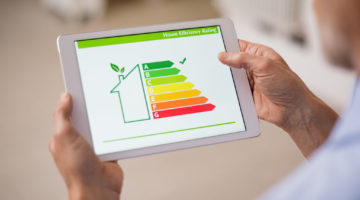
What is an EPC?
Energy Performance Certificates (EPC) were first introduced by the government in 2007, to present accurate representations of how energy efficient different properties are. This is especially important in the UK, where the housing stock can be hundreds of years old, and energy efficiency varies so massively. An EPC gives the property a number of points between 0-100, which equates to a rating between an A (highest) and a G (lowest).
An EPC is required by UK law every time a property is sold or rented.
Does a hotel need an EPC?
If you are renting, selling, or buying a hotel, it is required by law to have an EPC.
The certificates are divided into domestic and non-domestic types. A hotel requires a non-domestic EPC (also known as a commercial EPC), which is similar to a domestic assessment but with some important differences.
The biggest difference between a domestic EPC and the non-domestic EPC required for a hotel, is that a non-domestic EPC is significantly more detailed. The survey will therefore take longer – anywhere between an hour and a full day depending on size.
The EPC certificate also needs to be displayed in any hotel, guest house, or B&B larger than 500 sq. meters.
What kind of EPC energy assessor do I need for a hotel?
It’s important to note that different buildings need different kinds of assessment, and not every assessor is qualified for every type of assessment. Just because an EPC assessor has produced reports for thousands of homes, doesn’t mean that they are qualified to carry out an energy assessment on a hotel or other commercial property.
Non-domestic buildings are split into different categories, determined by the complexity of the property. Depending on the size and structure of the hotel, you’re likely to need either a level 3, 4 or 5 assessor. As you’d expect, the higher the level required for your hotel, the higher the cost tends to be. An experienced assessor will be able to tell you what level of assessment you require with just a few simple questions.
What does an EPC survey involve?
The visit itself involves gathering information about various aspects of the property. This includes the boiler, the insulation, the windows, the central heating system, any hot water tanks. If you don’t already have one, the assessor will make a rudimentary floorplan and take pictures as they work, in order to provide the evidence necessary to lodge the certificate.
EPC surveys are non-invasive. That means that if you have loft insulation, for example, the surveyor must be able to easily get up there to see in order to lodge it. They cannot take your word for it, and they can’t make boreholes to check for cavity wall insulation or cause any damage. If you have any work that you think should be included on the EPC that the assessor will not be able to easily see or access, paperwork like invoices or warranties can be used to prove the existence of it and get it included on the survey. This is important, as it can significantly improve your rating.
How much does a hotel EPC cost?
As we’ve mentioned here, there are a lot of factors that go into determining the amount of work and subsequent cost of any non-domestic EPC. Rates also differ around the country, and how far the assessor has to travel to reach you.
To give you a rough idea, prices for a small bed & breakfast EPC could start at around £200 +VAT, while the bigger hotels could be looking at prices in the thousands.
If you’d like a quote for your hotel EPC, fill in the form below and we’ll get back to you as soon as possible.












No Comments yet! Be the first one.